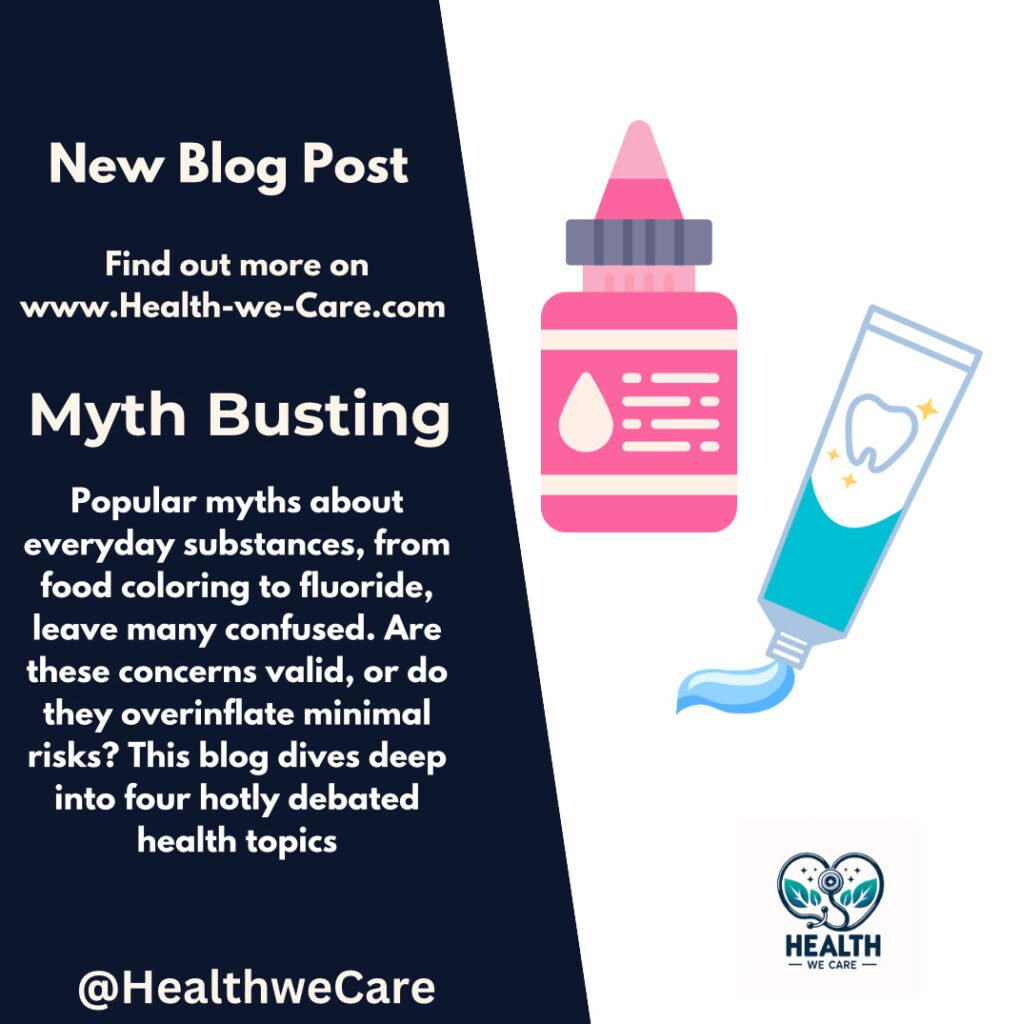Separating Fact from Fiction
In today’s digital age, health advice spreads faster than ever, often backed by influencers rather than science. Popular myths about everyday substances, from food coloring to fluoride, leave many confused. Are these concerns valid, or do they overinflate minimal risks? This blog dives deep into four hotly debated health topics: Red Dye 40, fluoride in toothpaste, artificial sweeteners, and detox teas. By breaking down the science, we’ll reveal which claims hold weight and which are blown out of proportion.
Red Dye 40: What’s the Truth About Its Effects?
The Concern:
Red Dye 40 is a synthetic food dye derived from petroleum, used to enhance the visual appeal of snacks, candies, and drinks. Critics claim it’s linked to hyperactivity in children, allergic reactions, and long-term health concerns like cancer. These fears gained traction following studies in the 1970s, particularly in children with behavioral disorders such as ADHD.
What Does Science Say?
Research suggests a link between artificial food dyes and hyperactivity in children, but it’s not definitive for the general population. The FDA and EFSA (European Food Safety Authority) maintain that Red Dye 40 is safe within regulated limits. However, a 2007 study published in The Lancet found that artificial dyes could worsen hyperactivity in susceptible children, prompting some parents to eliminate them from their kids’ diets
Moreover, allergic reactions like hives or asthma symptoms are rare but possible in sensitive individuals. Long-term cancer risks have not been substantiated, as current safety evaluations rely on animal studies at doses far exceeding typical human exposure
Should You Be Worried?
For the average person, occasional consumption is unlikely to cause harm. However, parents of children with ADHD might consider reducing artificial dyes, including Red Dye 40, as a precaution. Natural alternatives like beet juice or turmeric are gaining popularity in response to these concerns.
Takeaway: Moderation is key. The occasional candy won’t hurt, but opting for naturally colored products might offer peace of mind.
Discover Our Personalized Fitness Plans!
Are you ready to take your fitness journey to the next level? Our personalized fitness plans are designed to fit your unique needs and help you achieve your health and wellness goals. Get started on your path to success today! [Learn more here!]
Fluoride in Toothpaste: Boon or Bane?
The Debate:
Fluoride has long been hailed as a dental hero, reducing cavities by strengthening enamel and remineralizing early tooth decay. However, fluoride skeptics argue that it’s a toxic chemical capable of causing fluorosis, thyroid dysfunction, and even neurological effects.
Fluoride’s Role in Dental Health:
Fluoride works by incorporating itself into the tooth’s mineral structure, creating a more decay-resistant surface. Decades of research support its use in toothpaste and public water supplies, showing dramatic reductions in cavity rates
However, excessive fluoride exposure during childhood can lead to fluorosis, characterized by white streaks or spots on teeth. Though largely cosmetic, severe cases can weaken enamel. Concerns about toxicity stem from high fluoride levels in areas with naturally fluoridated water, far exceeding levels in consumer products.
Health Risks—Fact or Fiction?
Claims that fluoride lowers IQ or disrupts thyroid function come from studies with methodological flaws or populations exposed to abnormally high levels. Regulatory agencies like the CDC, WHO, and ADA confirm that fluoride is safe when used as recommended.
Myth Busted: Fluoride is essential for dental health when used correctly. Avoid swallowing toothpaste, especially for children, and stick to fluoridated water within safe limits.

Artificial Sweeteners: Healthy Swap or Hidden Risk?
Why People Choose Sweeteners:
With growing awareness of sugar’s role in obesity and diabetes, artificial sweeteners like aspartame, sucralose, and saccharin have become popular. Marketed as low-calorie or sugar-free, they promise the sweetness we crave without the calories.
The Criticisms:
Opponents claim artificial sweeteners trick the brain, increase sugar cravings, and disrupt the gut microbiome. Some studies link excessive consumption to metabolic syndrome, weight gain, and even cancer. For example, a 2022 study published in Nature Medicine found potential links between certain sweeteners and gut dysbiosis.
However, large-scale reviews by the FDA and EFSA consistently find artificial sweeteners safe for general use. The cancer scare stems from studies in the 1970s, where rats fed massive doses of saccharin developed bladder tumors. These doses were later deemed irrelevant to human consumption patterns.
Sweetener or Sugar?
Artificial sweeteners don’t spike blood sugar, making them beneficial for diabetics. However, overconsumption can lead to laxative effects (e.g., with sugar alcohols) or increased cravings for sweet foods, undermining weight loss efforts.
Verdict: While artificial sweeteners are safe for most people, relying on them too heavily might not be the healthiest choice. Balance is essential, and reducing overall sugar consumption—natural or artificial—is often the best approach.
Master Pull-Ups Like a Pro!
Struggling to conquer pull-ups? Dive into our comprehensive guide to mastering this ultimate upper-body strength move! From beginner-friendly progressions to expert tips, we cover everything you need to build strength, improve form, and hit your pull-up goals. Discover how pull-ups can transform your fitness journey and unlock your true potential. Ready to elevate your workout game? [Click here to read our full guide!]
Detox Teas: Miracle Cure or Marketing Hype?
The Detox Tea Trend:
Detox teas claim to cleanse your system, promote weight loss, and eliminate toxins. Celebrities and influencers often endorse these products, leading many to view them as a quick fix for bloating or excess weight.
What’s Really Happening?
Most detox teas rely on diuretic or laxative ingredients like senna, causing water weight loss rather than fat loss. While this may temporarily reduce bloating, it can also lead to dehydration and electrolyte imbalances. Overuse can damage the digestive system, particularly the colon.
Detoxification is a natural process carried out by the liver and kidneys, which efficiently remove toxins without external help. Nutritionists emphasize that “detox” diets or teas add little to no benefit unless there’s a specific medical need
Risks vs. Benefits:
Some ingredients in detox teas, like green tea extract, have genuine health benefits, including antioxidant properties. However, these effects are better obtained from whole foods rather than expensive, potentially harmful tea blends.
The Bottom Line: Skip the detox teas. Focus on a diet rich in fiber, hydration, and regular exercise to support your body’s natural detox processes.
Final Thoughts: Why Evidence-Based Choices Matter
Health myths often originate from kernels of truth but spiral into exaggerations, fueled by sensational headlines and anecdotal accounts. While it’s tempting to follow the latest trends, making informed decisions based on credible science is vital. Whether it’s food dyes, fluoride, sweeteners, or detox teas, context and moderation matter.
Practical Tips:
- Stay Skeptical: Evaluate health claims critically, especially if they come from non-scientific sources.
- Read Labels: Understanding ingredient lists helps you make better choices.
- Prioritize Balance: A healthy diet and lifestyle trump quick fixes every time.
For more insights into health and wellness myths, follow us on Instagram @HealthandfitnessbyJF, and check out our shop for science-backed tools and products to support your journey!




